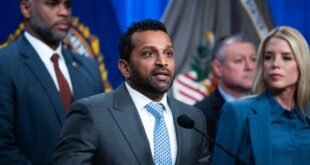A new political and legal conflict may be unfolding in New York City as Mayor-elect Zohran Mamdani prepares to take office on January 1. In recent public remarks, Mamdani has made clear that he intends to challenge federal immigration enforcement policies he views as excessive or unjust — a stance that could place New York City on a collision course with the federal government. His comments come at a time when federal authorities have increased immigration-related operations across several major cities, triggering both support and concern among local leaders.
The latest tension was amplified after New York City Councilman Shaun Abreu posted a video showing federal Homeland Security agents detaining a man in Washington Heights. The footage — brief and without full context — circulated widely online and quickly drew criticism from some local officials. Abreu described the arrest as “deeply disturbing” and raised concerns about whether the individual was afforded proper due process.
However, subsequent reporting, including court records, clarified that the man taken into custody — identified as Alpha Amadou Diallo — had previously undergone immigration proceedings. Diallo entered the United States illegally in 2021 and was ordered removed by a Biden-era immigration judge in 2024. Federal authorities stated that his case was not a surprise enforcement action but part of a legally authorized removal order already on record.
This clarification did not diminish broader concerns among some New York City leaders who fear that expanding federal operations could create fear within immigrant communities or undermine local authority. But it did bring renewed attention to the complex relationship between immigration enforcement and municipal governance — a relationship that often becomes strained during times of heightened political pressure.
Mayor-Elect Mamdani’s Position: Firm Opposition on Principle
Zohran Mamdani, a 34-year-old incoming mayor who previously served in the New York State Assembly, has taken a clear position on the issue. Throughout his campaign and in recent interviews, Mamdani has described Immigration and Customs Enforcement (ICE) as an agency that operates with insufficient oversight. He has also stated that he intends to oppose deportation efforts that he views as disproportionate or harmful, including cases involving individuals with criminal convictions if he believes they still warrant due process or local support.
During the campaign, Mamdani voiced his stance directly, saying:
“If you want to pursue your promise to create the single largest deportation force in American history, you will have to get through me to do that here in New York City.”
This statement — widely quoted in national coverage — signaled that a Mamdani administration would be different from previous city leadership. While New York has long positioned itself as a “sanctuary city” with policies limiting cooperation with federal immigration authorities, Mamdani’s rhetoric suggests an even more assertive role in standing against certain federal actions.
Shortly after his election victory, Mamdani expanded on his views when asked about immigration agents operating within the city. At a press conference regarding his transition to office, he said:
“My message to ICE agents, and to everyone across this city, is that everyone will be held to the same standard of the law. If you violate the law, you must be held accountable.”
He went on to express concern about a “growing sense” in parts of the country that certain individuals or entities are not held to the same standards as others, though he did not elaborate on specific cases.
Federal Authorities Maintain That Actions Are Within Legal Boundaries
So far, federal officials have not taken an aggressive stance toward Mamdani’s statements. Instead, federal agencies have reiterated that their operations in New York City — including the recent detention of Diallo — are conducted under existing legal authority and court orders.
Homeland Security officials have emphasized that removal operations targeting individuals with outstanding orders are standard procedure and not a shift in policy specific to New York. They also noted that some of the current operations were planned before the city’s mayoral election and are part of larger federal efforts to address nationwide backlogs in immigration cases.
Still, the federal government’s increased activity has fueled concern among local officials who fear expanded enforcement may escalate tensions or lead to confusion within immigrant communities. New York is home to millions of foreign-born residents, many of whom live in mixed-status households.
A Potential Showdown Over Jurisdiction
The possibility of a significant dispute lies in the overlapping authorities of federal, state, and municipal governments. While immigration enforcement is unquestionably a federal responsibility, cities can influence how much cooperation they provide in terms of information-sharing, detention requests, and coordinated operations.
Over the past decade, federal administrations from both major parties have at times clashed with local governments over cooperation. Court rulings have generally affirmed that cities cannot obstruct federal law enforcement but also cannot be compelled to act as immigration enforcement arms.
A Mamdani administration that openly resists certain federal actions could lead to:
• Legal challenges
Federal agencies could argue that certain city policies improperly hinder enforcement.
• Funding disputes
Previous administrations have considered withholding funds from jurisdictions deemed uncooperative, though such attempts faced legal limitations.
• Increased federal presence
If cooperation decreases, federal agencies may choose to operate more frequently without local coordination, leading to higher visibility and potentially more community concern.
• Political repercussions
Both city and federal leaders may face pressure from their constituencies to adopt firmer stances.
Public Safety Concerns Fuel Debate
The issue takes place against a backdrop of heightened concerns about violent incidents involving some individuals living in the country illegally. Nationally reported cases have intensified debate about how cities should balance public safety with civil liberties and humanitarian considerations.
Supporters of stricter enforcement argue that cities must cooperate fully with federal authorities to prevent further violence; critics contend that aggressive tactics can break down trust between immigrant communities and local police, making neighborhoods less safe overall.
Mamdani’s critics say his stance could make it harder to remove individuals who have committed serious offenses. His supporters counter that his approach prioritizes due process, equal treatment, and community stability.
What Comes Next for New York City?
As Mamdani prepares to take office, several key questions remain:
1. Will the city revise its sanctuary policies?
Existing policies limit cooperation on detainers and certain requests. A Mamdani administration could further expand these restrictions or choose to enforce them more strictly.
2. Will federal agencies increase operations in response?
If local cooperation decreases, more federal-only operations may occur in immigrant-dense neighborhoods.
3. Could the dispute lead to court battles?
Legal challenges over municipal non-cooperation remain a possibility.
4. How will city agencies — especially NYPD — respond?
The NYPD historically avoids participating in immigration enforcement. Whether this approach expands or changes under Mamdani remains to be seen.
5. What will be the political and public response?
With immigration a major national issue, local decisions in New York could gain outsized national attention.
Conclusion
New York City stands at a pivotal moment as Mayor-elect Zohran Mamdani prepares to assume office with a clear intention to resist certain federal immigration enforcement efforts. His position sets the stage for a potentially significant confrontation over jurisdiction, public safety, and the limits of municipal authority.
Federal officials, meanwhile, maintain that they are acting strictly within legal frameworks and implementing removal orders already issued by immigration courts.
Whether this disagreement becomes a defining conflict or ultimately evolves into a negotiated balance between federal and local authority will become clearer in the months ahead. For now, the city is preparing for a transition period that may reshape how New York navigates one of the most complex issues in modern governance.


